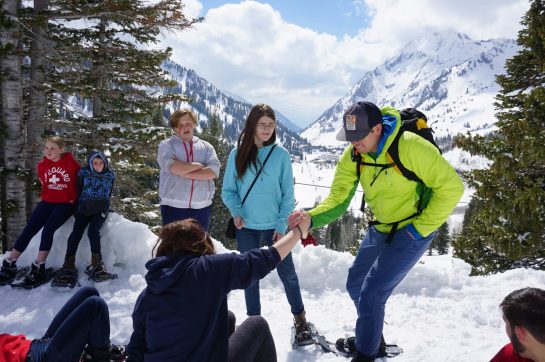Eccovia is proud to sponsor Pivot Adventure, a nonprofit organization that provides outdoor recreational therapy to teens experiencing mental health challenges. We interviewed Katie Allred, co-founder and CFO of Pivot Adventure, to bring more awareness to the good work her organization is doing to help teens cultivate mental resilience.
It’s no secret that the last few years have seen an increase in mental health struggles for teenagers. Social psychologists Jean Twenge and Jonathan Haidt wrote regarding this increase: “Many studies, using different methods and asking different questions, indicate that rates of adolescent anxiety, depression, and self-harm are rising for girls in the years after (roughly) 2012, compared to the years before (roughly) 2009, in the US and in the UK, as well as in other English-speaking countries. The increases for boys are sometimes smaller and are found less consistently.”
The team at Pivot Adventure, a Utah nonprofit that provides outdoor recreational therapy for teens, believes that what teens need today is to cultivate resilience—that resilience can be taught, learned, and lived.
Eccovia has been proud to sponsor Pivot Adventure, and we’re excited to spread the word on the good work they do.
What They Do
Pivot Adventure provides a resilience course to teenagers struggling with anxiety, depression, and suicidal ideation. Pivot provides an eight-week after-school program tailored to help teens articulate and normalize their mental health, as well as learn skills that help them deal with intense emotions.
Activities include outdoor sports and trust-building exercises under experienced adult supervision to ensure safety while also exposing the kids to perceived physical risk.
As Katie and her team often say, “There’s no comfort in growing zones, and there’s no growing in comfort zones.”
Katie explains further: “We don’t want this to be a program where teens are considered ‘broken’ and we’re trying to ‘fix’ them. We want to teach them skills that everyone can use to help with their own mental health. Everyone is going to have days where they don’t feel like getting out of bed. Everyone is going to have tragedy happen to them, and they need to know how to recover from those emotions. So by normalizing it and calling it a resilience program, we get the students on board and the parents on board.”
One way they signal that normalization of mental health to teens is by having the teens’ parents go through a series of parallel webinars at the end of each day during the course. “We tell the students, ‘Mom and Dad aren’t doing the rock climbing but they are learning the same concepts as you’,” Katie says.
One strength of gathering the students’ parents together is that the parents will often realize their kids’ struggles are not uncommon or untreatable.
Why They Do It
The co-founders of Pivot Adventure have both lost members of their own families to suicide and wanted to help other families before it was too late. They started out as wilderness guides for longer retreats of 8–12 weeks for teens struggling with mental health. While many of those programs can help, they’re not always affordable, and they don’t always yield desired outcomes in cases where teens are separated from their support networks
The team at Pivot Adventure sees the gaps in some traditional mental health services and aims to fill those gaps with accessible, affordable services with accredited counselors and outdoor experts.
For example, Katie cites the issue of insurance carriers requiring a formal diagnosis from a psychotherapist in order to reimburse parents.
“Particularly for teenagers who are trying to establish their own identity, it can be detrimental for someone else to give them a label,” Katie explains. “When they start to cling on to that label, it holds them back when they say, ‘I can’t do X because of Y diagnosis.’ They might start to see themselves as broken instead of as a human being struggling with certain aspects of mental health.”
That said, Pivot sees itself as a supplement to talk therapy, not as a replacement. In that sense, Katie’s team works closely with the parents to understand their children’s limitations or accommodation needs.
Why Resilience
Paul Bloom, psychology professor at the University of Toronto, reinforces the idea that chosen discomfort can have a silver lining: “It is the suffering that we choose that affords the most opportunity for pleasure, meaning, and personal growth.”
When any student engages in negative self-talk, one common question the guides at Pivot will ask them is, “Would you talk to anyone else the way you’re talking to yourself?”
Katie illustrates with an example: “[Students] are going to feel an element of perceived risk. They’re not really at risk, as we support them with adult professionals, but we bring them up to the level where they feel a little uncomfortable. They might start to feel their heart racing on a rock climb; they might start thinking, ‘You’re not good enough. You’re not a climber,’ and so on. And then we support them to get through the climb and deal with those thoughts.”
“We give them the opportunity to fail and succeed in a safe environment,” Katie says. “That is powerful.”
As of summer 2022, Pivot Adventure has served 461 students with its resilience training course. For more information on Pivot Adventure and how you can support them, go to pivotadventure.com.



